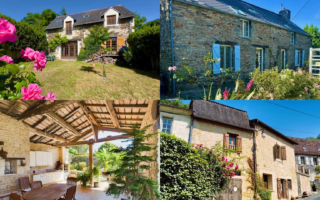Try before you buy
If you would like to try before you buy, perhaps renting a property would work for you. Samantha David explains how to go about it…
Renting a house or a flat is the obvious solution for many people who move to France. For those lucky enough to own property in the UK, it can also be useful providing a base from which to explore life in France. Tenants of rented properties have so much legal protection in France that the vast majority of letting agents and landlords not only want proof of your ability to pay but a legal contract from a garant (a third party who guarantees your rent in the case of any default. The papers required vary slightly from estate agent to estate agent, but generally comprise photocopies of:
– proof of your identity (ie a passport);
– an unsigned and cancelled cheque drawn on a French bank account. This proves that you are financially responsible because in France an unauthorised overdraft swiftly results in being banned from having a bank account. An RIB (relev�d’identit� bancaire) is also required (to return your deposit and to check that the account really exists);
– proof that you have paid all the rent on your current rented property; or, if you own a property in France, proof that you have paid the taxe fonci�re; or, if you own property elsewhere in the EU, proof that you own the property and are up to date with local rates and/or taxes; proof of your employment status and your income. This is normally an employment contract plus your payslips for the last 3 months, but if you are selfemployed this will also mean your income tax declarations for the last 3 years, and in some cases some sort of demonstration of your business (a sample of your work, a website, paperwork relating to a professional property or workshop etc, a siret [business registration] number, etc).
Your garant (guarantor) will in his/her turn also have to produce all the foregoing documents. Once you have started photocopying, you can start flat hunting. Properties described as a studio are basically bedsits; an F1 is a bedsit with a separate kitchen, and bis means that one room of the property could be reasonably divided into two distinct areas. F2 means a one-bedroom flat, F3 means two bedrooms, an F4 means three bedrooms, and so on. An F2/F3 means an F2 with a double-sized lounge area.
Floor space To confuse matters, T (for type) is often used instead of F (for forme or function) and neither term is legally recognised or defined. However, the advertised floor space usually gives another clue. Anything under 25m� is usually a studio, up to 30/45m� tends to be a studio with a separate kitchen, up to 55/60m� is a one-bedroom flat, and up to 80m� is usually a two-bedroom flat. After that things get more confusing as some spacious twobedroom flats are as large as 100m� but in other cases four bedrooms are crammed into the same space. Once you have found an advert you like, you phone the landlord or letting agent and ask to see it. If the viewing is conducted by the agent, you will be given a time and an address and will probably find yourself viewing the flat with other prospective tenants. More commonly however, you will be given the address and a key in exchange for your passport/carte d’identit� and a strict deadline for returning the key. Ask what is included in the tenancy agreement. In the kitchen for example, the only element that must legally be left in place is the kitchen sink. The rest of the equipment – cooker, fridge, washing machine etc – often belongs to the tenant. If the advert says cuisine semi-�quip�e this means there may be a cooker; cuisine �quipe� means fully equipped although not necessarily built-in. It is also wise to check that taps work, integral plugs (often found in hand basins, baths and bidets) are present and that outflows don’t leak. If the property is a flat in a large block, look on the frame of the front door, right down near the floor. You should see a small brass plate with a number on it. Make a note of this if you want to rent the property as you may need it to order a phone line. If you like the look of the place, you should tell the letting agent and produce all the documents forthe dossier straight away so as to reserve it, otherwise the agent will continue advertising and allowing other people to view it. Once the property is reserved, the real fun begins; first you have to wait while your dossier is inspected. Once the dossier has been accepted, the guarantor will submit their documents, sign their part of the contract (often by post) and then the tenant’s contract (le bail, or contrat de location) is drawn up. As soon as you have a date to sign the contract, contact the utility companies to make sure that either the property will be connected when you move in, or connected later on the very same day. The electricity is normally just a case of turning the power on at the fuse box, the water is usually just as simple. In town however, the gas will probably need to be turned on by an engineer from the gas company. As for telecommunications, although France T�l�com can normally connect you in only 2-3 days, it can take a low-cost telephone/internet/ television company up to three weeks to do so, so order well in advance.
Rental contract When you go to sign your rental contract, you will need to dust off your cheque book as well as sharpen your quill. The details vary according to the terms of the contract, but in general when you sign the rental contract you pay approximately a month’s rent to the agent as a fee (des honoraires) for his/her services. You will also have to cough up a month’s rent as a deposit (it is illegal to ask for more) and a further month’s worth as your first month’s rent in advance. You may also have to pay for nameplates for your post-box, front door and door bell, and you will definitely have to show that you have insured the property for third-party damage, fire, flood etc. You are then given the keys and can move on to the next step which is a thorough inspection of the property (un �tat des lieux) carried out by a notaire (huissier) in your presence at the agent’s expense. This is a contractually binding statement of the condition of the property. Be sure to point out any cracks, chips, marks on paintwork etc, so that they cannot be put down to you when you leave. If you find faults in the property within the first 2 months, you can have them added to the �tat des lieux. Finally, once the inspector has gone, you are free to move in and start your new life. All that remains is to open the champagne!
Share to: Facebook Twitter LinkedIn Email


